Globally, one in six children are out of school due to social, economic and cultural reasons. Girls are particularly affected, being 2.5 times more likely to be out of school than boys in conflict-affected areas.1
This deprivation has significant long-term effects on their learning, psychological well-being and life chances. VSO has been supporting marginalised children in developing countries through an innovative community engagement model that accelerates learning for girls out of school. This approach improves their access to quality, equitable and inclusive education, enabling them to unlock their full potential in life.
Over 4,000 girls in Kenya have attended the Catch-Up Centres, a safe haven to learn literacy, numeracy, life and business skills.
Almost half a million people participated in positive debates about the rights of girls and women.
60% of volunteers have continued supporting their communities beyond the ACTIVE project in Myanmar.
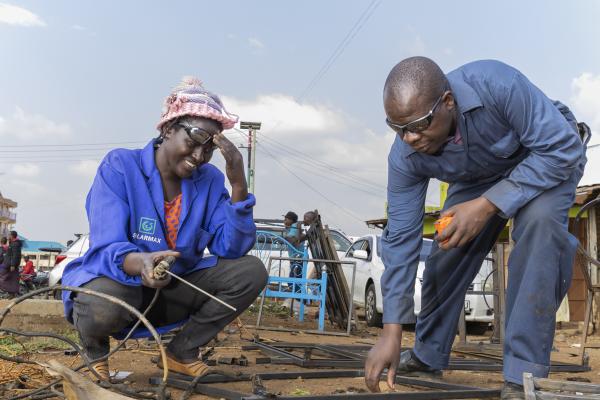
Catching up on girls education in Kenya
In Kenya, the Education for Life project, funded by the Foreign Commonwealth and Development Office of the United Kingdom, has been a transformative force for adolescent girls aged 10-19 who missed out on formal education.
The five-year initiative (2018-2023) aimed to improve the literacy, numeracy and life skills of over 5,000 out-of-school girls in the counties of Garissa, Isiolo, Kilifi, Kisumu and Migori. These girls, often facing vulnerabilities such as young motherhood due to sexual abuse, disabilities, conflict, modern-day slavery or early marriages, have found a lifeline through the project.
To address learning gaps, VSO, in collaboration with the government, established Catch-Up Centres within communities. These centres, located either at existing public schools or community centres, provided a safe environment for learning.
The Catch-Up Centres also supported the girls' transition into new pathways for decent employment, such as formal schools, apprenticeships, vocational training and entrepreneurship. In the centres, they also learnt basic skills and sexual and reproductive health, and received learning materials, start-up and hygiene kits and assistive devices such as wheelchairs and crutches.
Before the programme, I looked down upon myself and thought that without my husband, I couldn't live. Now I understand myself better and I can do some income-generating activities for survival."Adolescent girl on the Education for Life project.
The impact has been remarkable: over 70% of girls have gained employable skills, and 37% have ventured into learning about entrepreneurship, significantly boosting their prospects for a better future. As a result, these young women have become more aware of their rights and vocal advocates for themselves.
Mobilising, training and working with community volunteers is central to VSO's unique approach, especially to empower communities to take action to address their own challenges. These dedicated volunteers supported girls' health and education, mentored, guided them and played a vital role in ensuring flexible and consistent school attendance. Additionally, they significantly contributed to boosting the girls' self-confidence, decision-making abilities and participation in their communities.
The volunteers are also engaging the broader community, fostering positive attitudes and support for education for girls and children with disabilities, creating a lasting impact on the lives of these girls and their communities.
Supporting out-of-school child education in Mozambique
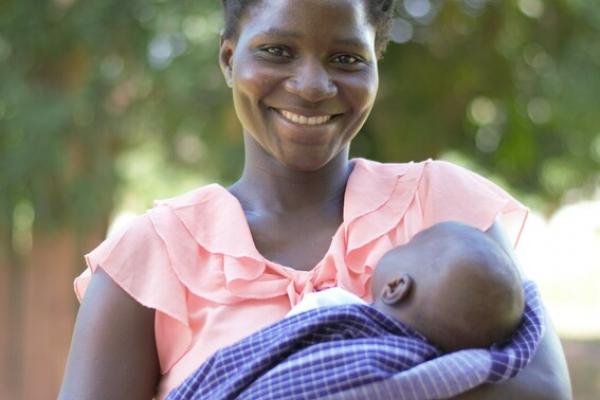
VSO strives to address the root causes of marginalisation, particularly the social norms and conditions, including conflict or lack of resources, that make people vulnerable. These often have inequality. discriminatory practices and unjust distributions of power at their heart.
In Mozambique, for example, some girls must walk up to 10 km to reach the nearest school, while others require permission from their husbands to receive education or are required to work on family farms. These challenges contribute to high dropout rates, significantly reducing their chances of rising out of poverty.
Since 2020, the Empowering Adolescent Girls to Learn and Earn (EAGLE) project, funded by Global Affairs Canada, has been committed to enhancing educational opportunities for girls in Mozambique. The project aims to improve the socio-economic conditions of 5,000 girls in the Sussudenga district by increasing access to education and improving their literacy, numeracy, life skills and economic
empowerment.
The project, which will run until 2025, focuses on out-of-school girls aged 15-19 who may be infected or affected by HIV/AIDS, victims of child marriage, or those excluded or discriminated against due to disabilities. In collaboration with government officials, the project has strengthened the local capacity of 18 learning centres to provide enhanced support for girls, including training on literacy, numeracy and sexual and reproductive health.
Additionally, the initiative has provided essential learning materials like blackboards and tablets and supplies such as dressings and soaps.
VSO is also raising awareness about gender equality through local radio debates, theatre performances and boys clubs' engagements. These efforts have fostered positive attitudes towards girls' and women's rights to education and preventing early marriages.
The programme has significantly improved the lives of these girls, leading to positive changes in their reading, writing and account management skills. The girls now feel more prepared to manage household affairs and maintain healthy relationships with their partners, founded on mutual respect, and are better equipped to implement family planning and address issues around family life. They have also become role models within communities, challenging stereotypes and biases and gaining better access to digital knowledge.
Through the ACTIVE programme, these girls’ communities are also greatly benefiting from support in disaster risk reduction. Schoolgirls are trained in agroecology, promoting sustainable practices and enhancing their economic prospects. Additionally, Disaster Risk Reduction Committees are assisted in creating preparedness plans for communities prone to disasters such as tropical cyclones, droughts and floods.
Breaking down barriers: Ensuring every child has access to education
Elisa Tomás is 18 years old and from Sussundega district, in Mozambique, and due to her physical-motor disability, she has never had the chance to study, unlike her brothers.
Thanks to the digital literacy programme of the EAGLE project, she benefited from literacy, numeracy and life skills classes.
Fostering inclusive education in conflict-affected Myanmar
"As a result of my consultation and guidance, some youths have been selected for scholarship
programmes, while others have been recruited as staff in various organisations," shares a VSO volunteer from the Rakhine region of Myanmar.
His experience is a powerful testament to how volunteers are becoming agents of positive change in their communities, particularly in conflict-affected countries like Myanmar, where the education system is in crisis.
Since 2022, in Myanmar's Mon state, the ACTIVE project, funded by the Foreign Commonwealth and Development Office of the United Kingdom, has supported over 310 community volunteers to improve and increase access to quality education for more than 2,800 children.
I felt embarrassed about my son's physical impairment. I supposed this was our fate and there was nothing we could do about it. However, following the home-visit of a volunteer teacher, my son has improved in literacy and behaviour, which used to be discouraging due to his disability."Mother of a child with a disability from Myanmar.
The project has provided safe learning spaces and trained educators, local civil society organisations, and youth volunteers in essential skills and knowledge, including leadership, conflict sensitivity, inclusive education approaches, climate change and waste management. As a result, educators are now better equipped to deliver basic education to vulnerable children, including those with disabilities, those who have experienced trauma, or those forced to drop out of school to work.
Inspired by the skills they developed through the project, many community volunteers from Myanmar
have initiated new projects such as community libraries for youth, environmental conservation efforts and learning spaces where vulnerable children can receive education and emotional support.
The ACTIVE project, which will run in Myanmar until 2024, is a remarkable showcase of active citizenship and the transformative power of volunteer training. Today, these volunteers have become true leaders in their communities, inspiring and motivating others to foster positive change.
Bringing the community together in a refugee settlement in Uganda
Early Childhood Care and Education (ECCE) is a child's gateway to endless possibilities. Taking place during a crucial stage of cognitive development, it lays the foundation for future success, not only in primary school, but throughout a child's educational journey and beyond.
In the Bidibidi refugee settlement in Uganda, VSO is bringing the community together to ensure that no child is left behind in early education. The ECCE-ACTIVE project (2022-2024), funded by the Foreign Commonwealth and Development Office of the United Kingdom, is engaging parents, caregivers, teachers, schools, and community leaders to improve children's access to quality, equitable and inclusive early childhood care and education.
Nearly 100 ECCE caregivers and early grade teachers have received mentorship and training, gaining new teaching skills to make learning more inclusive and engaging. Active citizenship is playing a pivotal role in the project, as community volunteers are becoming caregivers, teachers, youth group members and men champions, leading their own community's development.
As education advocates, they are spreading awareness about the importance of education and ensuring children remain in school. As a result, more children are enrolling and staying in school, improving their grades and overall learning experience.
Through a community-led feeding programme, the project is encouraging parents to contribute food for school meals, which is not only nourishing the children but also fueling their enthusiasm for staying in school. Using an inclusion and gender approach, fathers are intentionally involved in discussions about the significance of education, and as a result, they are becoming active champions of their children's care both at home and with the schools.
The ECCE-ACTIVE project has also fostered an inclusive learning environment where every child feels valued and supported in their educational journey. Disability-friendly infrastructure and materials and sensitisation efforts have helped draw children with disabilities into the project and shift the community’s mindset towards a more positive and inclusive attitude, embracing the most vulnerable learners.
Helping young mothers catch-up on their education in Kenya
Regina is a mentor at the Nyamagenga Catch-Up Centre in Southeast Kenya, part of VSO’s Education for Life project. She has been supporting Elizabeth and other vulnerable girls who dropped out of school.
Elizabeth is 14 years old and had her baby daughter when she was just 13. She lives in poverty but is now reclaiming her education at the catch-up centre and, in the future, wants to open her own small grocery shop.
Regina helps Elizabeth with life skills, such as cooking and how to wash clothes, and where to go to get medical check-ups with her baby daughter. She has seen big changes in Elizabeth and is proud of her.
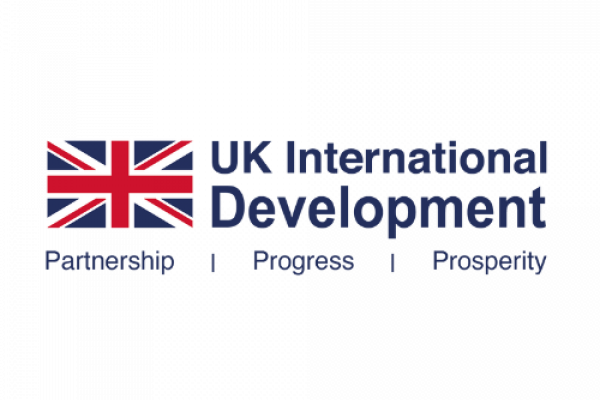
About ACTIVE
The ACTIVE programme is a multi-year grant from the UK government, worth £27m, running from April 2022. The programme supports the development of active citizenship across the Global South, so marginalised people are able to lead their own development, claim their rights to better public services and hold people in power to account.
Footnotes
- World Bank
Stories
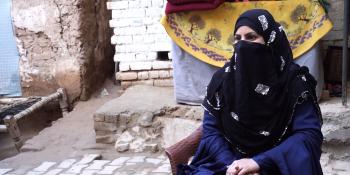
"Girls deserve an education just as much as boys"
Meet 26 year-old community volunteer Salma Rehmat from Afghanistan. Salma advocates for Afghan refugees and host communities in Pakistan to access a quality education. Find out more.
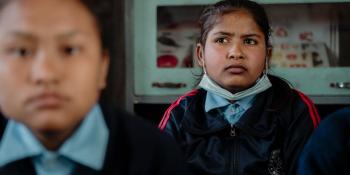
The right to education for girls with disabilities
Izna was born with a hearing impairment and her school in Nepal didn’t have the resources to support her, forcing her to drop out. With the help of the ENGAGE project, Inza is now back in education and thriving.
